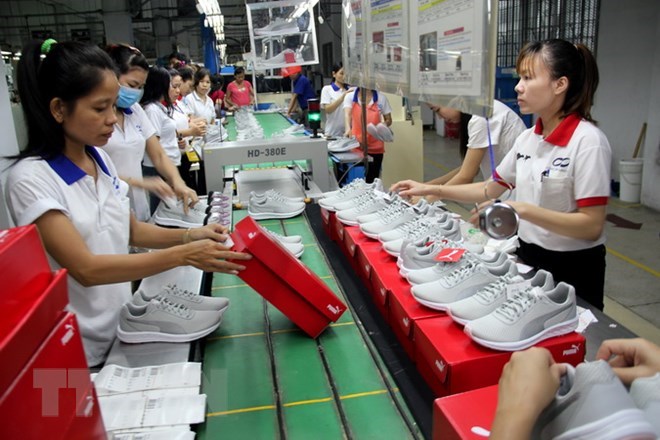



Illustrative
image (Source: VNA)
During the Vietnam Footwear Summit held in Ho Chi Minh City on
March 21, Kiet said Vietnam has moved up to the second place globally in
leather and footwear exports and third in manufacturing.
Last year, Vietnam earned more than 18 billion USD from leather exports, 16.4
billion USD of which was leather footwear, up 12 percent annually. Its major
importers are the US (36 percent) and the EU (30.6 percent).
There are opportunities for the industry to continue developing, he said,
adding that Vietnam has free trade agreements with major markets like Japan,
the Customs Union of Russia, Kazakhstan and Belarus, the Republic of Korea and
ASEAN in addition to the Comprehensive and Progressive Agreement for
Trans-Pacific Partnership and an agreement with the European Union.
According to him, Vietnam has a golden demographic structure with nearly 67
percent of the population at working age, providing an abundant supply of
workers.
It is forecast that the country could supply 60 percent of leather materials
for domestic footwear and handbags by 2030 compared to roughly 45 percent at
present.
Nguyen Thi Xuan Thuy, chief of the Strategy and Integration Policy Office under
the Ministry of Industry and Trade said Vietnam is home to more than 1,500
enterprises with nearly 1 million workers in leather sector and 500,000 workers
in the support industry. Most of them are more skilled than those in such
emerging markets as Cambodia, Bangladesh, Ethiopia and Myanmar.
Overall, Vietnam has advantages in workforce cost compared to China and Thailand
and has succeeded in producing and exporting high-value products.
Thuy said that once the Vietnam – European Union Free Trade Agreement takes
effect this year, Vietnam will able to expand exports and create momentum to
attract investment to the support industry.
She urged Vietnamese firms to conform to quality standards, ensure the rate of
locally-made products and commit to social responsibilities. Apart from
traditional markets such as the US and the EU, they should also focus on Asia,
which consumes more than half of footwear globally.
Philip Kimmel, Director of Kingmaker Footwears, suggested using less workers to
reduce costs and rearranging production.
Duncan Scott of New Balance Athletic Shoe Inc, said countries moving up the
value chain could stop making footwear and those continuing to make footwear
would need "sophistication”.
Cheap labour alone would not ensure success, and firms need to continue to
drive efficiency and digital connectivity, he said.
Delegates said proper use of automation could eliminate redundant workers and
make factories more efficient and profitable.
The industry is aiming rapid, sustainable development and better use of trade
deals to expand exports.
It plans to restructure production to add value to products, increase local
content, improve designs and focus on medium and high-quality products.
John Graebin from US footwear company Deckers Brands said more and more
automation solutions will be used, and that is an opportunity for Vietnam to
compete for decades to come.
Source: VNA